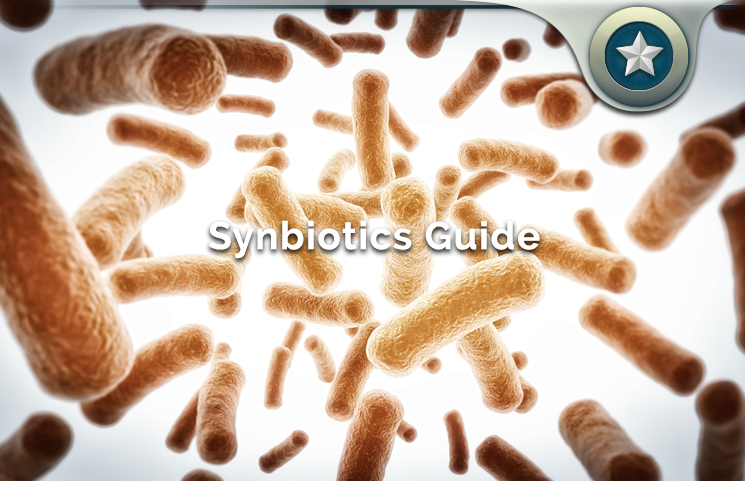Synbiotics are dietary supplements or food ingredients that have combined both prebiotics and probiotics in the form of synergism.
This combination can only be referred to as synergism when the prebiotics selectively favors the probiotics.
What Are Synbiotics?
True probiotic foods or supplements do not survive in the stomach on their own for long and require a prebiotic. The term is basically used to describe the synergy created when prebiotics and probiotics are used together.
Probiotics are live bacteria that are ingested with the aim of improving your health.
However, most of these live bacteria end up dying quite fast and never colonize the intestine as intended. A prebiotic on the other hand is a dietary supplement or food that offers health benefits on the host’s modulating microbiota.
Table of Contents
Prebiotics are not drugs. They can be fiber, but this does not mean any fiber in the stomach is necessarily a prebiotic.
Prebiotics are fibers like galactose and fructose that are consumed with the aim of stimulating the growth of microflora in the large intestine.
The combination of prebiotics and probiotics works separately in the small and large intestine, but the overall aim is to improve the gut health.
Prebiotics only stimulate the flora which is present in the gut already and not the one it is paired with as most people tend to think.
You’ve probably heard that certain foods are great when consumed together. In a simple layman’s language, probiotics are good bacteria for the gut while Prebiotics is fiber food that is good for the bacteria.
Prebiotics are simply food for the good bacteria you want to increase in your gut.
Humans do not digest prebiotics, but they are good for the growth of bacteria in our bodies.
Common prebiotics includes:
- Inulin
- Oligosaccharides
- Carbohydrate fibers
Prebiotics can be found from foods like fruits, whole grains, and vegetables
Synbiotic food combinations you can easily formulate
- Acacia gum with kombucha
- Beans and pickles
- Yogurt and Oats
- Yogurt, kefir, and honey
- Chia seeds and kombucha
- Pickled garlic acid and sour pickled onions
- Feta cheese and onions
- Green sauté with sour cream and garlic
- Yogurt or kefir with honey and acacia gum
- Yogurt or kefir with honey, acacia gum or chia seeds
These are simple food combinations you can make in the comfort of your home and get the desired good bacteria into your gut.
Kefir is known to be one of the most potent probiotic foods available with more strains than any other food and tastes better.
The honey gives you the prebiotics oligosaccharides that stimulate the probiotics and other bifidobacteria in the gut.
This mixture gives you the perfect combination of probiotics and prebiotics providing your gut with the good bacteria.
You can easily create your symbiotic food by using the combination of foods above in the right amounts.
However, you can also choose to buy the already processed symbiotic combinations that are readily available in the market.

How Synbiotics Work With Prebiotics & Probiotics In The Body
We’ve already seen what prebiotics and probiotics are and their importance to humans. How do these two works to benefit the gut? First, we have to note that prebiotics and probiotics work in tandem.
Probiotics, or the live bacteria, are quite delicate and can be killed easily with the stomach acid and heat.
This usually renders them inactive even before they get to their intended destination (small and large intestines). Individuals that rarely consume dairy products might also find the consumption of large amounts of probiotics quite difficult.
Probiotics, when consumed, nourish the good bacteria already present in the large and small intestine.
Prebiotics and probiotics work together to ensure the good bacteria in the gut are promoted. While probiotics add the good bacteria to the gut, prebiotics acts as the fertilizer nourishing the good bacteria already present.
They help the good bacteria grow improving the good bacteria to the bad bacteria ratio.
The ratio of good to bad bacteria has been shown to have a direct effect on your overall health and wellbeing.
It is good to note that the body does not digest any of the prebiotics in our bodies but instead uses them to promote the good bacteria.
This, in turn, promotes wellbeing and digestion health.
Recent studies have shown the important role good bacteria and prebiotics play in the mental health of individuals. Individuals who consume good amounts of prebiotics on a daily basis have few cases of stress, anxiety, and depression.
A test on their saliva showed low levels of the hormone cortisol which has been shown to cause mental health disorders in people.
Prebiotics, unlike probiotics, are not affected by heat or acids in the body. You need to consume a full-spectrum prebiotic supplement to get all the benefits prebiotics have to offer.
In the market, prebiotin is the only full-spectrum prebiotic which is a formula of oligofructose and inulin. It treats the entire bowel offering maximum benefit for the good bacteria.
Where Prebiotics Act On The Colon
Prebiotics act on different parts of the colon depending on the type consumed. The oligofructose tends to act on the right part of the colon while inulin acts on the left side of the colon.
Prebiotin which is a full-spectrum prebiotic acts in both areas of the colon making it by far the most effective prebiotic in the market.
For the probiotics to colonize the colon, they must first survive the transition from the stomach to the colon.
This is why most probiotics are consumed with prebiotics. Prebiotics help increases the survival rate of probiotics as they move from the stomach to the colon.
Benefits Of Synbiotics
The benefits of probiotics in the human body have been found to be considerably higher when these two are consumed together than when probiotics are consumed alone.
Synbiotics have been shown to have the following health benefits in people:
Anti-Microbial
This is achieved more by the probiotics that tend to accumulate the intestinal walls and to crowd out the bad bacteria.
They compete for nutrients with the bad bacteria helping to reduce the number of the bad bacteria. Probiotics have also been shown to stimulate non-specific and specific antigen immune responses.
Anti-Diarrhea
Diarrhea in individuals is caused by certain harmful bacteria.
The introduction of good bacteria reduced the number of bad bacteria that are likely to cause diarrhea in people.
Synbiotics further strengthen the intestinal walls reducing the chances of diarrhea in people.
Anti-Cancer
Synbiotics have been shown to have anti-carcinogenic effects although more research is needed to verify these claims.
However, it is thought that the sugars that are fermented by these starches do inhibit the growth of the carcinogenic cells.
The levels of calcium and magnesium have also been found to increase which in turn controls the rate of the cell turnover.
Lab studies have shown the probiotic bacteria inactivates carcinogens. These bacteria have been shown to inhibit the growth of certain tumors in the body directly.
Anti-Allergy
Allergic reactions in people are caused when certain antigens get absorbed through the intestinal walls.
This can be stopped by probiotics that reinforce a barrier function on the intestinal walls preventing the absorption of such antigens.
Prevention Of Osteoporosis
Synbiotics can help prevent cases of osteoporosis in people through the improved absorption of minerals in the body.
Prebiotics like the oligosaccharides binds calcium and magnesium in the small intestine only releasing them in the larger intestines where they are absorbed better.
The fermentation process also produces fatty acids that help with the mineral absorption process.
Regulation Of The Immune System
Prebiotics have been shown to have the ability to increase the amount of circulating immunoglobulin which improves the immune system.
The bacteria further enhance the nonspecific immune mechanisms increasing the phagocyte activity of the cells.
Improves Digestion
The effectiveness of synbiotics on digestion depends on how good they are retained in the gut.
The prebiotics travel through the gut helping feed the bacteria there without being digested. In the process, they help with the digestion process through the by-products formed.

Studies have shown that synbiotics not only have an effect on the liver but also on the brain dysfunction in individuals that have liver disease.
Top Synbiotics Products
The market is filled with products; however, you do not have to buy these synbiotics to get the benefits they offer.
There are hundreds of natural sources of synbiotics from plants and dairy products.
You just have to know which foods give you the bacteria and combine the right prebiotics and you’re good to go.
Probiotics can be found in the following foods:
- Chocolate
- Onions
- Leeks
- Bananas
- Whole grains
- Asparagus
- Tomatoes
- Legumes
- Dairy products especially yogurt
- Red wine
- Maple syrup
These are great sources of probiotics, but then you will need to combine prebiotics as you consume them to help them get through the stomach to the colon alive.
Synbiotics (Probiotics & Prebiotics) Final Verdict
Synbiotics are a great source of good bacteria and a good option when you want to remain healthy.
They are readily available from the foods we eat and benefit us in so many ways.
Increasing the number of synbiotics we consume on a daily basis helps balance out the bad bacteria in the gut giving us all the benefits good bacteria offer.









